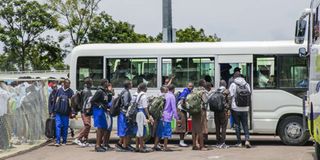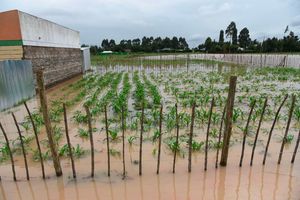Teen pregnancies threaten schools re-opening

What you need to know:
- More than 7,000 learners in Rwanda could drop out of school when the academic year begins as defilement, teen pregnancies, early marriages, domestic violence and child labour cases rise.
- Over 1,500 girls among children defiled during the lockdown and impregnated, with some contracting sexually transmitted diseases.
- High poverty levels caused by Covid-19 pandemic increased girls’ exposure to gender-based violence, risk of early marriages and teen pregnancy.
More than 7,000 learners could drop out of school when the academic year begins as defilement, teen pregnancies, early marriages, domestic violence and child labour threaten the future of children.
Nation has learnt that already, over 1,500 girls are among children who were defiled during the lockdown and impregnated, with some contracting sexually transmitted diseases.
High poverty levels caused by Covid-19 pandemic increased girls’ exposure to gender-based violence, risk of early marriages and teen pregnancy.
According to Save the Children, at least 9.7 million children globally, could be out of school forever by the end of this year.
Save the Children Rwanda told Nation that even though they haven’t concluded their research on the actual number of children at high risk of dropping out of school, they are certain the rate will almost double the usual rate reported yearly.
Faustin Mutwarasibo, Dean of School of Journalism and Communication at the University of Rwanda, notes that a high number of students will drop out of school, calling on the government and other stakeholders to move with speed and rescue potential victims.
“Everywhere you go in the country cases of defilement, teen pregnancies have increased, boys are engaged in simple jobs that give them little money and others are already on streets to feed themselves. How do you expect them to easily return to school,”? Ms Mutwarasibo wonders.
“There is need for more awareness among parents and children while at home to psychologically prepare students that going to school is still a priority like it was before Covid-19; otherwise, many children are likely to never return to school,” he adds.
Officials from Save the Children Rwanda predict that the crisis will impact children from poor families and the most vulnerable, especially girls transitioning from primary to secondary schools, those living with disability and children whose families want to use them for work.
“We have seen anecdotal evidence of an increase in child marriages and defilement cases,” says Maggie Korde, director of Save the Children Rwanda.
This means those married, defiled and whose rights are violated stand a smaller chance of going to school when schools resume.
Ms Korde says the longer schools take to reopen, the more children engage in employment, ill- behaviour and other activities to a level that it will be difficult to convince them to return to school.
“Schools reopening should not be secondary to other services and businesses re-opening, but should be a priority,” she said, adding “If a society can make some provisions for safe re-opening of restaurants, shops, beauty services, these planning and thoughts can be put into ensuring the continuation of children’s education,”
“We understand that as girls and boys face challenges in their families including poverty, lack of food, poor parenting practices, violence and sometimes they are told to go to the streets to feed themselves, it becomes impossible to convince them to return to school when learning resumes,” says Ms Korde.
She, however, adds that as school reopening date remains unknown, girls are likely to be worse affected than boys, with many forced into early marriage as the impacts of the recession triggered by Covid-19 hits families.
Save the Children Rwanda further says they already know parents and guardians who will not manage to provide necessary material, such as school uniforms, fees, and other necessary scholastic materials.




